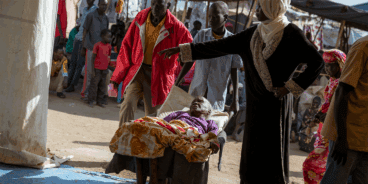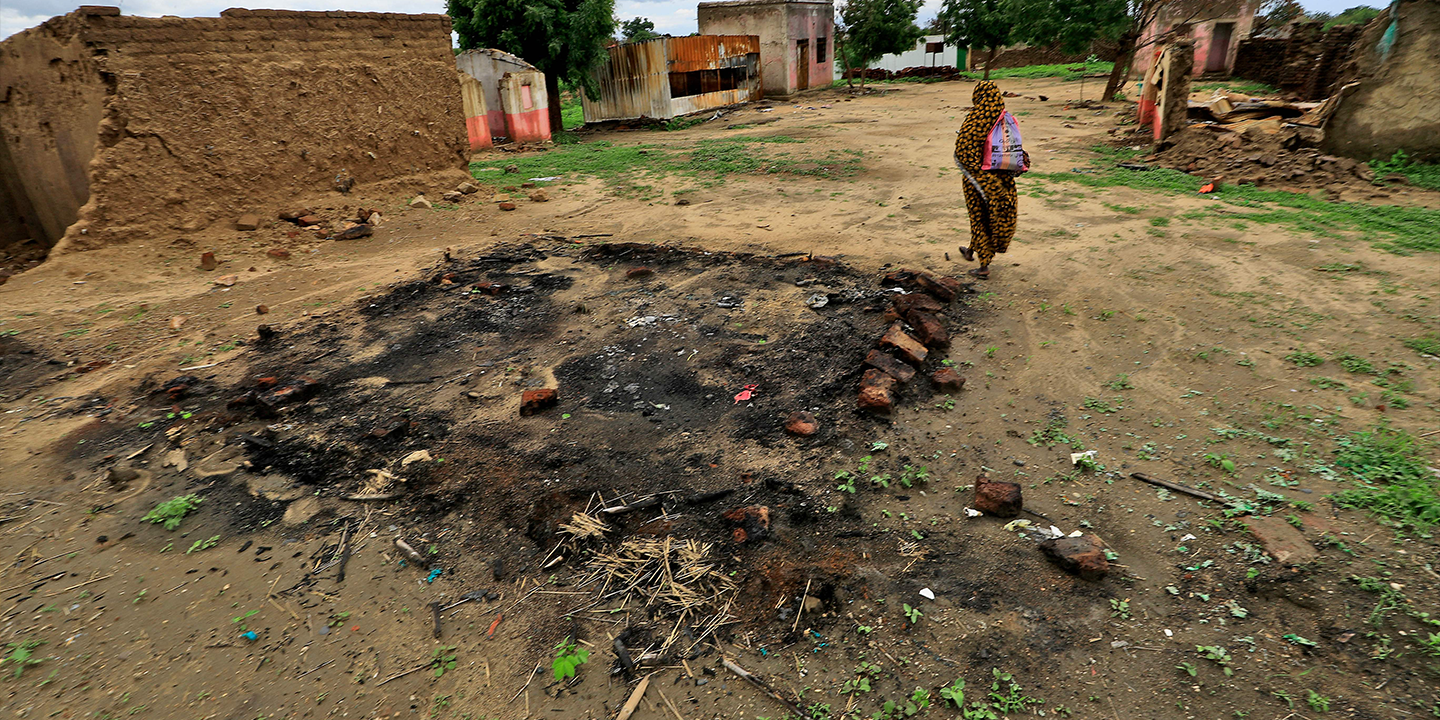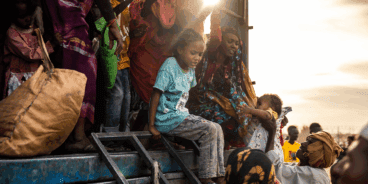

Atrocity Alert No. 345: Sudan, Ukraine and the Central Sahel
Atrocity Alert is a weekly publication by the Global Centre for the Responsibility to Protect highlighting situations where populations are at risk of, or are enduring, mass atrocity crimes.
COMMUNAL VIOLENCE ESCALATES IN DARFUR AS CONFLICT IN SUDAN CONTINUES
On Friday, 28 April, the UN Office for the Coordination of Humanitarian Affairs (OCHA) raised alarm about the rapidly deteriorating situation in El Geneina, West Darfur, where fighting between the Sudanese Armed Forces (SAF) and the Rapid Support Forces (RSF) has triggered inter-communal violence. Organizations with presence in West Darfur report the use of heavy weapons and the deliberate targeting of civilians based on their ethnicity. Clashes between Arab communities and the non-Arab Massalit have resulted in at least 191 people killed since 25 April, according to the Norwegian Refugee Council. Hospitals, markets, banks, humanitarian infrastructure and internal displacement camps have reportedly been looted, attacked and burned to the ground.
As result of the security vacuum and lack of control over armed militias in Darfur, civilians fear that the violence may degenerate further. Both the SAF and RSF may exploit the tense situation in West Darfur to further consolidate their geographic control. Toby Harward, the Principal Situation Coordinator for the UN Refugee Agency in Darfur, said, “If the fighting isn’t brought to an immediate end, it could unleash communal conflicts that will have an absolutely devastating effect on the very fragile social fabric of Darfur and risk repeating previous conflicts.”
Populations in Darfur have endured decades-long conflict and atrocities. During former President Omar al-Bashir’s 30-year rule, the Arab Janjaweed – supported by the government – allegedly committed crimes against humanity, war crimes and genocide against civilians. The UN estimates that in Darfur alone, over 300,000 people were killed and 2.5 million forced to flee since the conflict began in 2003. Despite the considerable progress made prior to the October 2021 coup – including the historic Juba Peace Agreement signed by the transitional Sudanese government and several armed groups in October 2020 – peacebuilding efforts in the region have been severely impeded over the past year and a half. Populations in El Geneina have continued to face several outbreaks of inter-communal violence, particularly between the Arab Rizeigat community and the non-Arab Massalit community.
Two weeks since the fighting between the SAF and RSF broke out in Khartoum, the humanitarian and human rights situation across Sudan has continued to deteriorate. OCHA estimates that at least 528 people have been killed and 4,600 injured since 15 April while acknowledging that the actual figure is likely much higher. An estimated 334,000 people have been internally displaced while an additional 100,000 have fled to neighboring countries. These numbers are already higher than all conflict-related displacement recorded during 2022 in Sudan, according to the International Organization for Migration.
The international community has a crucial role to serve in helping to de-escalate the situation, including in Darfur, and must scale up its humanitarian response. All parties should adhere to ceasefire agreements and implement humanitarian pauses to allow civilians and aid workers safe and unhindered freedom of movement. All armed groups must respect International Humanitarian Law and should refrain from attacking civilian infrastructure, including hospitals.
RUSSIA LAUNCHES INTENSE SERIES OF DEADLY MISSILE STRIKES ACROSS UKRAINE
Since 28 April the Russian army has launched large-scale missile strikes across Ukraine, its first nationwide aerial assault in nearly two months. Earlier today, 3 May, Russian forces killed eight civilians in apparent artillery strikes on Ukraine’s southern region of Kherson, which has been under near constant bombardment. The attacks struck a hypermarket and railway station and hit nearby villages. In the eastern city of Pavlohrad – approximately 60 miles from the front line – two people were reportedly killed and 40 wounded by shelling on 1 May. The governor of the southeastern Dnipropetrovsk region said that the strikes on 1 May damaged 19 apartment blocks, 25 houses, six schools and several shops in the region. Days earlier, Russia launched intense missile strikes overnight on 28 April on several cities across Ukraine. Over the course of 24 hours regional officials in the north, east and south of the country reported Russian artillery, mortar, rocket or drone strikes in 11 regions, killing at least three people, wounding dozens of others and destroying more than 100 residential buildings. In central Ukraine, at least 23 civilians, including four children, were killed when an apartment building in Uman was hit by a rocket and set ablaze.
Acting Humanitarian Coordinator in Ukraine, Matthew Hollingworth, condemned the wave of airstrikes, stressing, “It is just inexcusable that in places like Uman, far from the front line, civilians were killed while sleeping at their homes. This must stop.” Catherine Russell, Executive Director of the UN Children’s Fund, also denounced the bloodshed, stating, “War is the worst enemy of children. The violence must stop.”
The recent series of missile strikes come as Ukrainian officials prepare to launch a counteroffensive to retake occupied land. Russia had launched waves of aerial attacks from October until early March, often targeting energy-related infrastructure in what the UN has said may amount to crimes against humanity. Since the invasion in February 2022 Russian authorities have perpetrated a wide range of violations of International Humanitarian Law (IHL) that amount to war crimes, including intentionally targeting civilians and civilian objects.
The UN Committee on the Elimination of Racial Discrimination (CERD) recently expressed deep concern about human rights violations perpetrated by Russian forces and private military companies in Ukraine, including enforced disappearances, torture, rape and extrajudicial executions. CERD said it had received “disturbing” reports of incitement to racial hatred and propagation of racist stereotypes against ethnic Ukrainians and of alleged forced mobilization and conscription into the army both within Russia and on other territories under Russian control.
As the aerial assaults targeting residential buildings and other civilian areas escalate, civilians remain at risk of further atrocities. All parties to the conflict must strictly adhere to IHL, including by ending indiscriminate attacks. It is essential that international monitors and the staff of the UN Human Rights Monitoring Mission in Ukraine receive unfettered access to all areas of Ukraine in order to monitor, assess and report on further crimes.
CATASTROPHIC LEVELS OF FOOD INSECURITY IN CONFLICT-AFFECTED AREAS OF THE SAHEL
On 18 April UN officials warned that the combined effects of conflict, climate shocks and high food prices are driving food insecurity to record levels in the Sahel region. UN officials reported that an estimated 45,000 people are on the verge of starvation – one step away from famine – in the Sahel, including 42,000 in Burkina Faso alone. Nearly one million children under five in the Central Sahel – Burkina Faso, Mali and Niger – will face severe wasting this year, according to the UN Children’s Fund (UNICEF).
Food needs are on the rise at a time when humanitarian access is becoming increasingly challenging in conflict-affected areas, with spiraling violence in Burkina Faso and Mali in particular hindering the delivery of humanitarian aid. UNICEF Regional Director for West and Central Africa, Marie-Pierre Poirier, said, “Growing insecurity and conflict means vulnerability is increasing in the region, and it is getting harder to help communities in isolated areas.”
Recurrent violence perpetrated by armed Islamist groups – including groups affiliated with al-Qaeda and the so-called Islamic State – has devastated both Burkina Faso and Mali for years. These groups have systematically blockaded dozens of villages in the Central Sahel and are restricting access to farmland, lining roads with improvised explosive devices and landmines, and strategically destroying and looting civilian objects, including food reserves, water services and livestock. These tactics are used to terrorize populations, inflict collective suffering on communities and deprive them of an integral element of livelihoods.
While livestock raiding has been a primary source of funding for these groups for years, cattle rustling has surged to unprecedented levels, with armed Islamist groups taking cattle worth tens of millions of dollars a year. For example, according to a new report by the Global Initiative Against Transnational Organized Crime, in Mopti – one of the hardest hit regions by violence in Mali – approximately 130,000 cattle were stolen in 2021, about the same amount looted from 2018-2020 combined. In Burkina Faso armed Islamist fighters can earn approximately $50,000 per month from cattle rustling in conflict-affected northern regions. The report notes that as these groups capture more territory, increased looting is fueling conflict among already impoverished communities struggling to survive.
Humanitarian, development and financial partners must provide support to the governments across the region in bolstering food security and access to vital social services and protection. When designing and implementing multisectoral approaches to address the crisis in the Sahel, the international community must account for the needs of populations, including vulnerable and marginalized groups, as well as cattle rustling as a driver of conflict.
Related Content


Atrocity Alert No. 461: Israel and the Occupied Palestinian Territory, Global Landmine Report and Ethiopia
